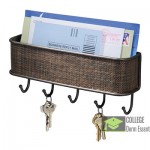
Moving out of your parents’ house and into a dorm room is perhaps the most important moment in the life of a young adult, but there is way more to it than you may initially think. Meeting new people and immediately having to share a room with them is not as easy as it sounds, and not having your parents to assist and control your every move is something that you will soon be missing.
Even though diving head first into freedom and getting away from your parents may sound perfect for some, if you embark on this journey unprepared, your dorm room life will quickly turn into a very unpleasant experience.
That is why we prepared a list with the most important things you should know before moving into a dormroom, and some tips to help you surviving the dorm experience.
4 Important Things You Should Know Before Moving Into a Dormroom
Roommates
Among all the challenges that you might face during your time living in a dorm room, perhaps the biggest is having to accept that everyone has different personalities, and this includes you and your roommates. And even though many roommates become some of the best friends, there are others who don’t even look at each other.
Most colleges have their students categorized and separated by their backgrounds or personal preferences on some subjects, such as personal alcohol policy or noise tolerance, before assigning them for a dorm room, but you never know exactly what you will end up paired with. Preparing for the worse is recommended in these situations. Expecting noise at inappropriate times, the lack of privacy that comes with sharing common rooms with inconsiderate people, and personalities that are exceptionally difficult to deal with should not be a shocker to you.
The best way to minimize this problem is through conversation. Being friendly and thoughtfully expressing your expectations can go a long way. Obviously, not everyone will respond positively and make a change, so the best you can do in those cases is damage control: buying ear plugs, or going to the library or another quiet space to study for example. In extreme situations, requesting a transfer to a different dorm room will solve all problems.
Living Space
Another important point is that after moving into your dorm room, you will have to adapt and learn how to live, and share your personal space with basically strangers. Most dorm rooms in America are 12-by-12 feet which means that you and your peers will have to be thoughtful about what you bring into common space, so that you don’t make each other uncomfortable.
Communicating with your roommates is crucial here. Getting to know what each person will be bringing beforehand will give you a head-start towards better personalizing your dorm, and making the best use possible of the space available. You will hardly need more than one refrigerator or one television for example, so pre-defining the roles can make everyone’s life a lot easier.
Lastly, something else that you should also have in mind before moving into your dorm room is that you will never have privacy like you had in your parents’ house. Keeping an extra eye out to your personal belongings and valuable common items should effectively minimize your chances of having a very unpleasant surprise.
House Rules and Balancing Interests
Even if things start really well with your roommates, chances are that problems will eventually start coming up. Personalities clashing and different opinions on household matters are extremely common. Having the right approach towards those situations is extremely important.
Most common problems can be easily avoided by sitting down with your “new family” as soon as you move in, and setting a couple of simple ground rules. Some very important topics that you should always discuss, and ideally prevent from becoming a problem, are:
- Guests – agreeing about numbers and hours
- Noise – defining appropriated hours and levels
- Cleaning – distributing the chores, discussing the neatness in which the place should be kept
- Privacy – establishing boundaries
- Household items and food – what will be shared, what each person will be bringing into the dorm room
- Bathrooms – discussing shower lengths, schedules, and space management (this is more important than it looks like)
It is very important to outspeak your opinions and make your voice heard. If you don’t agree with one of your roommate’s postures, communicating and adequately expressing how you feel solves more problems than you would expect.
Being A Good Roommate
Definitely the easiest way to make living in a dorm room a pleasant experience. Keeping in mind that you and your roommates are in very similar situations is extremely important, also, as often as not, if you treat your roommates well and show them you also appreciate their efforts towards making the dorm room a better place for everyone, they will work harder to improve even further.
The first rule of being a good roommate is being considerate. Always having everyone’s best interest in mind, and sometimes putting what you want aside for the greater good is the key for good conviviality. Not blaring music at inappropriate hours, respecting your college’s rules and the agreements you made with your peers for example, are good ways to keep everyone’s morale high and being respected as a roommate. “Do to others as you would have them do to you”.
There are also a couple of unspoken rules that are often not mentioned or agreed upon before, that is because they are tightly tangled to common sense, and widely considered basic for most social interactions. Not smoking indoors, looking after your roommate’s belongings, and respecting if they need some privacy with their girlfriends are broad examples.
Conclusion
Moving out of your parents’ house and into a dorm room is an extremely important step in the life of a young adult, and can definitely make for some of the best times of your life, keep in mind that it is nothing like the movies though. A lot of hard work and dedication must be put into your relationship with your roommates and the preservation of your room if you wish to make some memories worthy of remembering.





